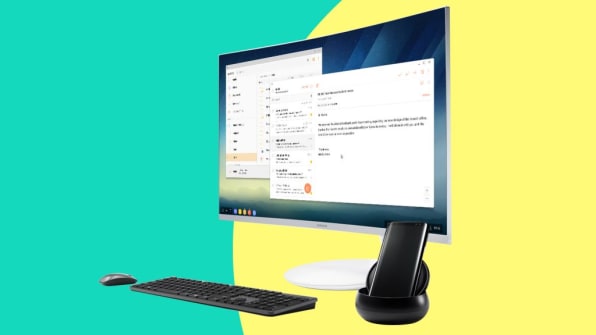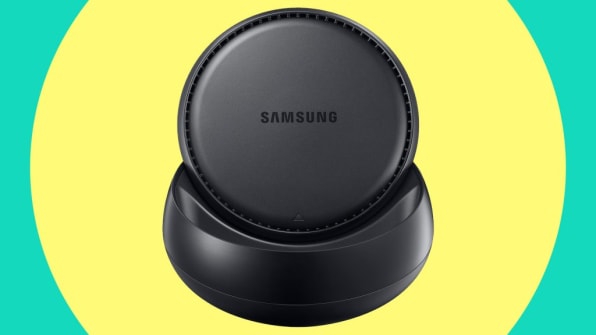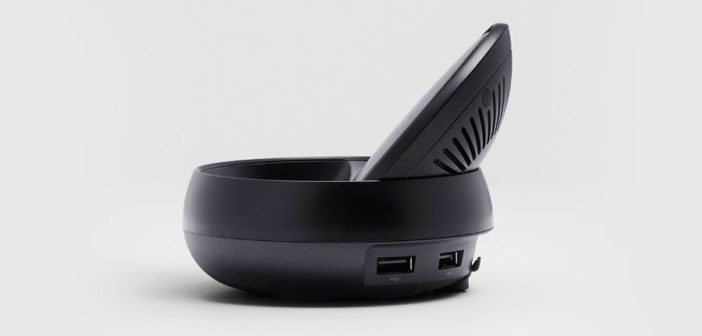Google, Microsoft, and Samsung are all trying to bridge your mobile and desktop life. Why is Apple holding out?
We’ve all had moments when we wished our phones were full-blown computers, complete with keyboards, mice, and desktop interfaces with drag-and-drop-capable apps. So far, the perfect hybrid device remains elusive–but this week, Samsung announced its own attempt.
When Samsung launched its new S8 smartphone on Wednesday, it also introduced a potentially groundbreaking peripheral. It’s called Dex, and it’s basically a little black bowl into which you place your S8 so it can dock with your keyboard, mouse, and display (price TBA, but rumored around $160). However, what you see on your computer isn’t just a big version of Android, distorted across your 24-inch monitor. Rather, Samsung actually designed a secondary interface for Android that looks like Windows, Mac OS, or any other desktop you know. Inside it, supported mobile apps can function just like desktop apps. (And if you’d actually like to run the real Windows OS, it will support streaming Windows from a remote computer via an internet connection.)

Samsung’s demo was brief but convincing. It showed how Dex’s interface lets a user multitask between email and a slide-show creator to build a presentation on their phone–the kind of too-complicated-for-a-smartphone productivity task that we’ve all nonetheless needed to do on a smartphone at one point or another. I, for one, was sold. And I, like everyone else who watched the presentation, wondered: “Why doesn’t Apple do this?”Apple actually does have a recently unearthed patent that seems to dovetail with what Samsung is doing here. But in Apple’s vision of the future, depicted in the patent, your iPhone could dock into an empty laptop base. In other words, Apple would sell you a brainless laptop to be powered by the phone it also sells you. Your iPhone can be a Macbook–if you buy a Macbook that’s potentially unusable without the iPhone.
It’s a concept that’s both clever and silly at the same time, and proof that though the company may be thinking about how to bridge its phones and computers, Apple’s product line doesn’t afford it Samsung’s flexibility. Cupertino has two operating systems, Mac OS and iOS, which encourage users to buy multiple products. Merging each operating system, or each device, could cannibalize a part of its business. Even though it is clearly inevitable and would make our lives a lot easier at times.

Plus, consumers are demanding hybridization of desktop and mobile. We want to be able to touch and type, access any piece of information across devices, and basically compute any way we want to at any moment. Look at the success Microsoft is having with its Surface line based on its simple premise: It’s a tablet that you can use as a real computer, so you have one less thing to carry around, one less platform to give you a headache. Meanwhile, Google, too, is reportedly bringing a “desktop mode” to Android N that would allow a much more PC-like interface to the mobile operating system.With Mac sales stagnant and iPad sales plummeting, maybe Apple finally has impetus to break down the barriers between its products. But in the meantime, Samsung, with a hyper-successful smartphone line but no ties to its own old operating systems, is giving the public a feature that every Apple user would fawn over–one that still leaves it plenty of opportunities to sell more stand-alone keyboards, mice, and LCD displays of all sizes even if it never sells another laptop again, because Samsung builds pretty much everything. Here’s seeing if Apple is willing to break its own business model to match the offering.
–
This article first appeared in www.fastcodesign.com
Seeking to build and grow your brand using the force of consumer insight, strategic foresight, creative disruption and technology prowess? Talk to us at +9714 3867728 or mail: info@groupisd.com or visit www.groupisd.com

